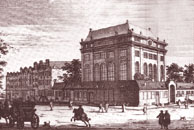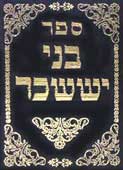
#1092
Make the Almighty's Will Your Will
The ultimate formula for mastering patience is: "Make the Almighty's will your will."
Those who internalize this will automatically and spontaneously be
patient. Repeat this message to yourself over and over again. "I will
make the Almighty's will my will."
-- "If it's the Almighty's will that I need to wait for someone, that too is my will."
-- "If it's the Almighty's will that I need to repeat myself, that too is my will."
-- "If it's the Almighty's will that I need to wait until I find out some information, that too is my will."
(From Rabbi Pliskin's book, "Patience")
#1093
The Pleasure of Learning Torah
Rabbi Simcha Zissel of Kelm wrote:
"The wise person lives a life of pleasure. If pleasure-seekers would
only be aware of the great potential for pleasure through studying Torah
wisdom, they would give up seeking physical pleasures and would focus
on obtaining Torah wisdom!"
(Chochmah U'mussar; cited in Rabbi Pliskin's "Gateway to Happiness," p.97)
17 Tevet

In
1728, Congregation Shearith Israel purchased a plot of land in lower
Manhattan, site of the first structure ever designed and built as a
synagogue in continental North America. At the time, New York had the
only Jewish community in the country; it would be some two decades later
before organized Jewish settlement began in Philadelphia, Lancaster and
Charleston. Shearith Israel was the only Jewish congregation in New
York City from 1654 until 1825, having been founded by Brazilian Jews of
Spanish and Portuguese origin. Governor Peter Stuyvesant, known for his
anti-Semitic views, had initially denied Jews the right to worship in a
public gathering; these Jews fought for their rights and won
permission. Today, Shearith Israel occupies a grand structure at 70th
Street and Central Park West.
18 Tevet

Yahrtzeit of Rabbi Zvi Elimelech Shapiro of Dinov (1783-1841), author of the chassidic work, B'nei Yissachar.
A brilliant scholar, kabbalist, and leader of Polish Jewry, Rabbi
Shapiro worked vigorously to strengthen the Jewish community in light of
the assimilationist trends brought about by the Enlightenment.
17 Tevet
Beware and guard yourself lest you forget the words that your eyes witnessed [at Sinai] (Deuteronomy 4:9).
While forgetting is a spontaneous occurrence, it is nevertheless
perfectly appropriate to instruct someone not to forget. Personal
experience is that if we have something extremely important to do and we
are afraid we might forget it, we leave ourselves various reminders to
make certain that we remember.
Except when it is due to an aberration in the brain, forgetting
something is an indication that it was of relatively little importance.
How do you feel when someone who you expected would remember you does
not know your name? Also, do you not feel awkward upon meeting someone
and having to admit you do not remember his/her name? These feelings are
due to the awareness that forgetting something indicates that it was
not all that important.
The revelation at Sinai at which we received the Torah was not only the
most important event in the history of the Jewish nation, but also the
event that should be the fulcrum of the life of every individual Jew. It
is the Divine origin of the Torah that makes its values permanent and
unalterable, rendering it beyond human manipulation. If we forget the
Divine origin of Torah, we are likely to tamper with it and adapt it to
comply with our own wishes. When this occurs, all values become
relative, and this may result in the behavior of the individual and the
group being determined by expedience, hardly a standard of ethics that
dignifies a human being."
Today I shall ...
... try to remember that there are fundamental and unalterable values
that should guide me, and that these are the will of God as revealed in
the Torah.
18 Tevet
No one ever anticipated (Rabbi Yochanan ben Zakai) with a greeting in the public place (Berachos 17a).
The Talmud states that when Rabbi Yochanan ben Zakai met someone
in the street, he always initiated the greeting, and that never, in his
entire lifetime, did he ever wait to be greeted first.
Rabbi Yochanan ben Zakai is one of the most outstanding personalities in
Jewish history. After Jerusalem fell to the Romans, in 70 C.E., he
served as both the political and religious leader of the Jewish nation
for forty years. He is singlehandedly responsible for the survival of
Israel during that difficult era.
When this great leader walked down the street, he undoubtedly engaged in
important conversation with his colleagues and disciples on the vital
issues of the day. We certainly could understand that he could not
interrupt such weighty discussions to respond to people who greeted him,
let alone to initiate greetings to others.
Still, the Talmud states that regardless of his preoccupation with the
leadership of Israel, this great personality never waited to be greeted
first, and not even the importance of his position could cause him to
expect recognition from others.
The great Hillel prophesied about Rabbi Yochanan that he would be "a
father of wisdom and a father to many generations." Rabbi Yochanan was a
leader who followed in the footsteps of Moses, whose humility also
paralleled his greatness."
Today I shall ...
... try to consider every person as being worthy of recognition, and
avoid the false pride of expecting to be acknowledged first.



